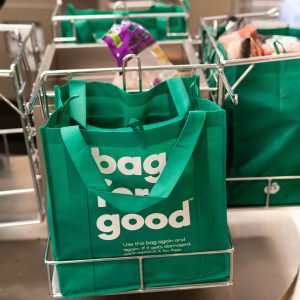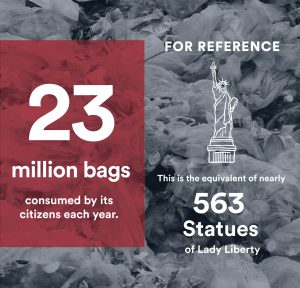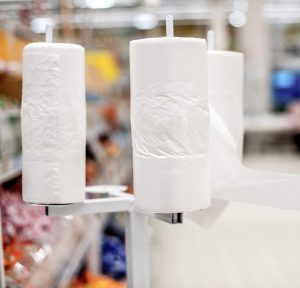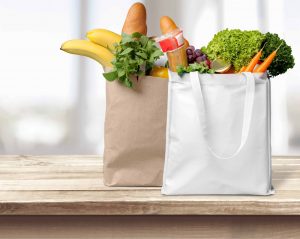Start spreading the news – New York is leaving its plastic bags behind for good
Update: October 19, 2020 New York will enforce the plastic bag ban following months of delay.
On March 1, 2020, New York rolls out its comprehensive plastic bag ban that will attempt to reduce the 23 million bags consumed by its citizens each year. To put that into a very New York perspective, that’s the equivalent of nearly 563 Statue of Liberty monuments.
Following the trail blazed by California in 2016, the New York Department of Environmental Conservation (DEC) has taken action against single-use plastic bags, prohibiting their distribution by retailers across the state. Reducing the reliance on disposable plastic bags is seen as a big step towards a more sustainable state.
For businesses operating across New York though, there’s likely to be something of a learning curve required to adapt to the new rules. After all, the convenience and cost-effectiveness of plastic bags are among the reasons that we’ve become accustomed to a material that we’ve now learned takes more than 500 years to breakdown.
Let’s take a look at what the New York plastic bag ban means for you and your business, giving you the tools you need to seamlessly transition to a plastic bag-free future.
New York plastic bag ban exceptions – what’s not included under the ban
The list of exemptions from the New York plastic bag ban is as follows:
- Plastic bags used to wrap uncooked meat, fish, seafood, poultry, or other unwrapped food, flower, or plant item exclusively
- Plastic bags used to package items such as fruits, vegetables, grains, small hard (nuts, bolts, screws) live fish or insects, from bulk containers
- Plastic bags used to package sliced food or food that is prepared to order
- Plastic bags sold in bulk if they are pre-packaged
- Plastic bags sold as trash bags
- Plastic bags sold for food storage, such as Ziplocks
- Plastic bags used as garment bags, such as those used in dry cleaners
- Plastic bags used as carry-out or delivery bags for takeout food
- Plastic bags used for prescription drugs
- A film plastic bag for which there is no alternative (defined by the DEC)
New York plastic bag ban exceptions – sourcing alternative bags
Reusable bags are subject to strict definition as laid out by the DEC, and include:
- Bags specifically designed for multiple uses
- Bags with a minimum lifespan of 125 uses with the strength to carry 22 pounds over at least 175 feet
- Bags that hold at least 22 pounds for the entire lifespan
- Bags with at least one strap or handle
- Bags that are hand or machine washable
Additionally, reusable bags as defined within the New York plastic bag ban exceptions should exhibit the following:
- Bags must have a minimum of 10 mm thickness when manufactured from LDPE, HDPE, or other plastic
- Bags must have a minimum fabric weight of 80gsm when manufactured from non-film plastic of natural, synthetic, petroleum-based, or non-petroleum-based origin
What can my business do to prepare for the New York bag ban?
 Preparing your business for these new regulations is extremely important—both to remain compliant and to ensure your customers are not affected. Thankfully, most consumers are extremely positive about the NY plastic bag ban, and the rise of the #BYOBagNY movement will help businesses adapt with less difficulty than if these new regulations were unpopular with the general public.
Preparing your business for these new regulations is extremely important—both to remain compliant and to ensure your customers are not affected. Thankfully, most consumers are extremely positive about the NY plastic bag ban, and the rise of the #BYOBagNY movement will help businesses adapt with less difficulty than if these new regulations were unpopular with the general public.
In order to encourage consumers to bring their own bags, businesses may consider offering small discounts. However, businesses cannot rely solely on the consumer, and sourcing alternative bags should be a priority. Providing free, branded tote bags made from sustainable materials is one route that can help bring brand exposure and help you remain compliant. Alternatively, bags can be sold for a small fee using the ban as an incentive to push consumers towards multiuse.
What does the New York plastic bag ban mean for recycling?
The New York plastic bag ban will not affect existing recycling requirements, and retail stores must still collect and recycle film bags properly. While the ban will reduce the strain on recycling facilities by factoring-out the bulk of waste plastic, any remaining plastic bags must be recycled responsibly after the March 1 cutoff.
RTS offers a variety of options to help your business adapt, and is offering plastic-bag pick-up that will allow you to schedule the collection of leftover bags as required. Additionally, RTS is partnering with aNYbag to ensure that plastic bags are upcycled into reusable bags that fit within the DEC guidelines.
Want more information on how to prepare for the New York plastic bag ban?
For more information, contact RTS today to get your plastic bags picked up.




